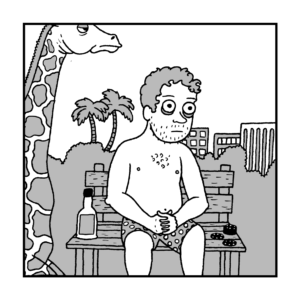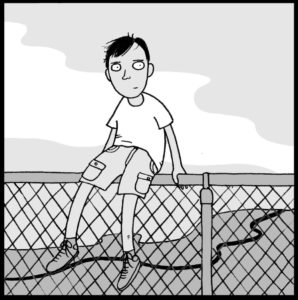
Don’t look now, but today is Election Day. Yes it is. I’m assuming you live in New Jersey, now. And if you don’t, why don’t you? You could make your stand in the shifting sands of New York City, giving ground, receding farther out into Long Island as the rest of the city is turned into a black-helicopter-supervised hellscape. You could flee to California and put yourself right in the crosshairs of climate change and a potential megadrought (counterpoint: they may be getting single-payer out there). The correct answer is probably Baltimore, or Richmond, or Providence, Rhode Island. But I’m sticking it out here in the Jerz, as I always do, and that means today I get to do something that most of the rest of the country only dreams of doing. I can go into the ballot box and take electoral action against a regime and an executive I don’t like one bit.
Indirectly, I mean. This is a primary election, which means I’ll be deciding between a guy who has been endorsed by national Democratic Party figures, has a ludicrous amount of money, and who gives me a not-insubstantial case of the heebie-jeebies, or three challengers who position themselves as underdogs but who actually represent various flavors of Jersey institutional politics. Those challengers aren’t going to win, so in a real sense it’s not an election at all. But there’s nothing new about that around here, and a good lever-pulling can cheer up even the most inveterate sourpuss. I’m probably going to vote for Jim Johnson because Amy Jacob from Prosolar Mechanics wants me to, and I like Amy a lot more than I like Raymond Lesniak or the Wiz. No matter who wins, though (ha ha, like there’s any chance it’s not going to be Phil Murphy), that’ll be my guy in the fall. Yours too, unless you’re completely insane.
See, here in Jersey, there’s no place to go but up. Even if Joe Piscopo had run and won, that still would have been a massive improvement over what we’ve been saddled with here. The Christie Administration was a dry run for what’s been happening on the national level — I mean autocratic governance by the biggest, loudest, most irrationally petty jerkface imaginable — so we’ve gotten a sneak preview of the movie that has transfixed the nation. We know how it ends: in eight nasty years, with government departments broke and public services run into the ground, a huge slime trail of bully-boy corruption, and everybody angry at everybody else. It’s not pretty, America, what you’ve got in store for you. I hope you’re not counting on former chiefs of the FBI, of all people, to get you free from this bind. No, the only way out is to get organized and vote for people who will stand up for our regional autonomy. Which in practice means electing leaders who’ll tell the White House that their absurd policies don’t play here.
Murphy gets a lot of grief because he’s from Goldman Sachs; Wisniewski, in particular, has been laying pretty hard on that buzzer. Honestly, I think he’s been right to. That’s not because I think the banksters, as Springsteen likes to call them in his weaker moments, are any more evil than any other corporate decisionmakers, because they really aren’t. It’s because I believe that as a quintessential Wall Street gazillionare, Murphy is wide open to the same populist line of attack that hobbled Hillary Clinton in the general election. The counterargument is that Hillary Clinton was and is pretty popular in the Garden State: she crushed Bernie in the primary and won the general by something like fifteen percentage points. I don’t think affiliation with the financial services industry is the same kiss of death here that it is in Wisconsin, I guess.
I further believe that Chris Christie has discredited himself so thoroughly that Kim Guadagno, attached to the governor’s slimy self like Kuato in Total Recall as she is, won’t be able to exploit the opening provided by Murphy’s problematic resume. But wait a sec, there’s no guarantee that Guadagno will get the Republican nomination, and again I’ll be frank — the other guy worries me. Ciattarelli has, in case you haven’t noticed, made Hudson County his personal punching bag. It is his position, and I believe it’ll be a popular one out in the sticks, that the Abbott money for our school districts is an unfair allocation of state tax dollars. In other words, now that we’re all wealthy motherfuckers over here and we’ve got our own Barcade, it is, according to Mr. Ciattarelli, time for dad to cut off our allowance.
I’d find his attitude revoltingly condescending even if it wasn’t true that the city belt has been carrying the burbs for at least as long as I’ve been alive, and it’s my humble opinion that they might express a little g-d gratitude for this. But it is true, and even though I really don’t like to bring it up, he started it, so I’m going to finish it. We’re not the ones who chucked so much sprawl at the map that the state is presently choking on it. We’re not the ones sticking strip malls and condo subdivisions atop some of the best farmland in the world. We didn’t design our communities so they fall apart every time there’s a gasoline shortage. We’re not the ones who treat art and culture like a bizarre indulgence, rather than the human necessity that it is, and then wonder why our lives feel empty and directionless. Sure, we’ve come up, and it’s nicer here than it used to be, and some people have more money and opportunity than they used to (there’s also plenty of hardship, and many of our people still need assistance). But every inch we’ve gained has been in the teeth of constant opposition from resentful suburbanites who are leading some of the most irresponsible, unhelpful, unsustainable lives imaginable. It’s been exhausting, and we’re sick of it. We won’t be lectured to by you people. Go on, clean up your own Hillsborough.
Okay, go vote, and then enjoy today’s song. The lyrics are a bit elliptical, but the attached story (Mario) ought to make it clear what’s going on: it’s the daydream of a corrupt politician. You can always count on me to have sympathy for the Devil, as long as the Devil in question is a nice fellow and not, as certain Devils are, a roaring ass.








